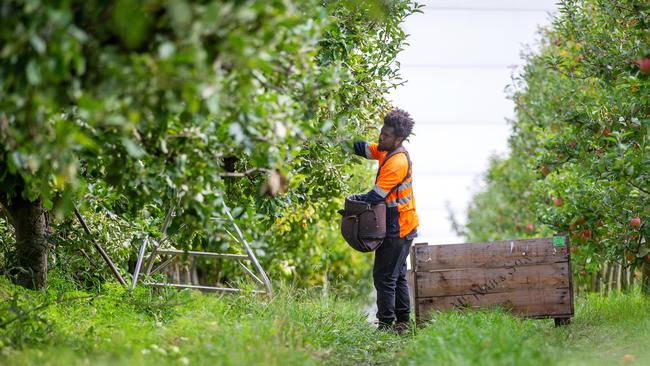PALM plan wilting as new rules hit
Fiji has flagged a potential reduction in the volume of unskilled workers it will contribute to the PALM scheme.
More stress will be heaped on the Pacific Australia Labour Mobility scheme in coming years after Fiji Prime Minister Sitiveni Rabuka flagged a shake-up of that nation’s engagement in the program, including a potential reduction in unskilled and semi-skilled workers.
That scenario would increase pressure on the federal government to adjust the PALM scheme or extend it to other nations to fill agriculture’s worker shortages, after other participating nations also indicated capping their contribution.
The Weekly Times reported on Wednesday that desperate farmers were also increasingly searching for staff outside the plan due to recent and future rule changes designed to better protect workers increasing employers’ regulatory, compliance and cost burdens.
Mr Rabuka said that while Fiji was “grateful” the PALM scheme had provided employment for many of its unemployed and underemployed workers, he had already discussed a change in settings with Australian Prime Minister Anthony Albanese.

“In our talks we have looked at ways of improving the lot of workers and perhaps reduce the volume by increasing technical co-operation in our education so that if we maintain the volume, it will be more skilled, a bit more skilled, rather than the semi-skilled or unskilled,” he told reporters in Canberra on Wednesday.
“Our problem is that they get, the wages they get here are better than what they get at home.”
The news follows growing pushback from other PALM partner nations with Samoa, Tonga and Vanuatu also looking to restrict supply.
Samoa’s Prime Minister Fiame Naomi Mata’afa told the ABC recently that the nation was “feeling the impact of losing our human resources” and it must “look at how we respond”.
The issue for agriculture is that the PALM scheme was specifically designed to be a temporary circular labour migration program between Australia and the Pacific and Timor-Leste that fills unskilled, low and semi-skilled workforce shortages across rural and regional Australia.
Meanwhile, in response to a question from a Fijian journalist regarding continued reports that “some of our workers continue to face ill treatment by some of the employers”, Mr Albanese said the government intended to eliminate worker exploitation across the economy via the proposed Closing Loopholes industrial relations reforms.

“We think overwhelmingly the PALM scheme has been an enormous success,” he said.
“The (Closing Loopholes) legislation provides for a criminalisation of wage theft.
“And we know there have been unfortunately some examples (within PALM). What we are looking for here is win-win. Australia benefiting from the contribution of labour from the Fijian workforce, but Fiji benefiting from the repatriation of economic benefits back to families in Fiji.”
Meanwhile, Nationals leader David Littleproud said the Coalition was “devastated” that Labor had abandoned the Morrison government’s ‘ag visa’ open to 10 Asian nations because “we don’t have enough” workers available from the Pacific.
“At the most it’ll only reach 42,000, so the maths doesn’t add up. (And) there’s a whole range of other administrative issues that they’re rolling across, that are just making it too costly,” he said.
“And … farmers are walking away from the PALM Scheme, and they’re just hoping that they can find some backpackers.”
EARLIER
Cracks are appearing in a “broken” Pacific Australia Labour Mobility scheme with desperate farmers increasingly searching for staff outside the plan, while new data shows the number of new participants has slowed significantly.
Farm leaders said new requirements on the program – which is the government’s main solution to agriculture’s worker shortages – had put a “handbrake on participation” and rendered it “uncompetitive”.
Australian Fresh Produce Alliance chief executive Claire McClelland said her warnings in June that the “onerous” changes would trigger a producer exodus were “unfortunately bearing fruit”.
The government has made significant investment in the scheme and ramped worker numbers from 13,000 to 37,000 since forming government in May 2022 to March 31 this year.
However, Department of Employment and Workplace Relations data reveals there were only 38,247 Pacific Islander workers in Australia at September 30.

According to DEWR, the number of workers in horticulture, which employs the vast majority of the PALM workforce, fell from 71 per cent to 68 per cent of the overall cohort, while meat processing increased from 24 per cent to 27 per cent.
Ms McClelland said the data “demonstrates reduced recruitments” and that, anecdotally, more employers were asking labour hire companies for workers outside the PALM scheme, including backpackers and locals where available, because of the “difficulty of operationalising the new requirements”.
The changes, which are designed to improve worker protections, include offering 30 hours of work per week, averaged over four weeks, from January 1, increasing 30 hours every week from July 1.
“There is a changing composition of the workforce and it’s a real shame because PALM is really important for horticulture, we just want the program to work and have some certainty around who’s going to pick the fruit,” Ms McClelland said.
“The government has attempted to eliminate all risk from the program without considering what the outcome will be and it is not working.”
Approved Employers Association chief executive Steve Burdett said industry was “very concerned” that the substantive changes are “not working”.

“Costs are becoming exorbitant and it is making the PALM scheme uncompetitive. I seriously believe the government has lost focus on what the scheme is there to do,” he said.
“They have gone way too far with administrative, inspection and reporting burdens. People are walking away while other employers sign up with no idea of what they face.”
Mr Burdett said a new departmental IT system introduced mid-year had also been “an absolute disaster” and was blamed for stalling recruitments.
He said “early indications” were fewer PALM workers would be available for agriculture with a noticeable shift of PALM participants to meat processing, aged care and other areas of worker shortages.
The situation is also compounded by a growing pushback from partner nations with Samoa, Tonga and Vanuatu looking to restrict supply.
Samoa’s Prime Minister Fiame Naomi Mata’afa told the ABC recently that the nation was “feeling the impact of losing our human resources” and it must “look at how we respond”.
NFF workplace relations and legal affairs general manager Ben Rogers said the government was “undermining usability and confidence in the program”.
“The current and future system only works for a fraction of the farm sector, and that fraction is likely to shrink going forward as the new settings take effect,” he said.

However, the government has thrown its weight behind the scheme principally to boost regional diplomacy, after killing off the ‘ag visa’ introduced by the Morrison government.
A spokesman said the changes had improved the system to “better support workers and deliver for industry”.
He said the number of approved employers had increased from 424 prior to the June changes, to 453 on October 13.
Farm leaders said proposed changes to migration and visa settings, industrial relations reforms and a regional accommodation shortage were adding to “nervousness” for farmers and that the agriculture workforce was “at the whim” of several ministerial portfolios.



